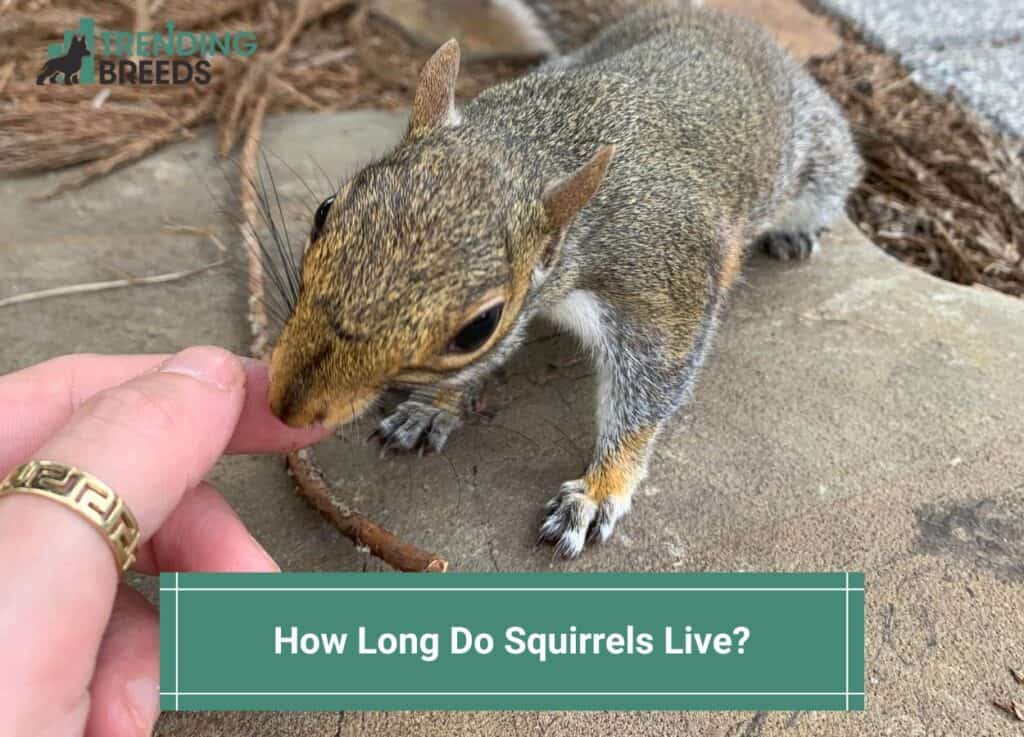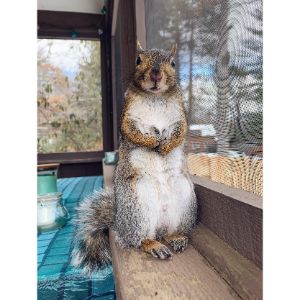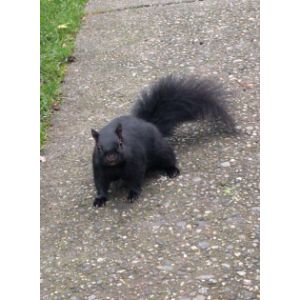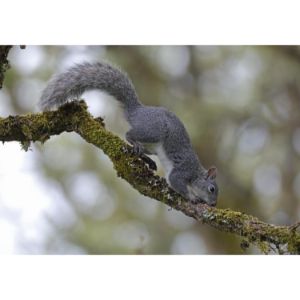
Squirrels, being rodents, have demonstrated remarkable adaptation to urban environments. But while rodents don’t have a reputation for living very long, how long do squirrels live?
Their resourceful and curious disposition and ability to forage for food in diverse habitats have contributed to their exceptional resilience.
Squirrels boast an average lifespan of approximately two to four years, which various factors can influence.
These factors include breed, habitat, food, disease, predators, etc. If the animal has optimal living conditions, it can survive more than the average lifespan.
However, a squirrel’s life expectancy can be drastically low if it lives in worse situations.
Let us delve into the factors that affect a squirrel’s lifespan and shed light on their longevity.
Before you scroll further down this guide, check out these other animal-related articles: Does A Squirrel Lay Eggs? and What Is a Maltipoos Lifespan?.
Table of Contents
Squirrels’ Lifespan Outside Captivity

Assuming that squirrels live past their second year, they tend to have a pretty good lifespan in nature.
Unfortunately, the first two years of their life are the most vulnerable, and many do not make it to their second birthday due to predators such as hawks, foxes, bobcats, and humans.
However, if a squirrel can evade predators during its first two years, its chances of living longer significantly increase.
Despite this, most young squirrels are usually killed or eaten before adulthood. In addition, those who avoid predators can succumb to diseases or harsh weather conditions.
Squirrel’s Lifespan In Captivity
Squirrels that spend their lives in captivity have significantly longer lifespans than their wild counterparts.
That is because they are not exposed to predators and get better nutrition and shelter than they would receive in their natural habitat.
Moreover, captive squirrels receive medical attention when they fall ill, enhancing their lifespan. Depending on the squirrel species and the quality of care they receive, they can expect to live up to 16 years or even longer.
Things That Can Effect A Squirrel’s Lifespan

The lifespan of a squirrel can be influenced by various factors, with habitat being a crucial determinant. Where a squirrel lives plays a significant role in determining its lifespan.
For instance, living in an urban setting, such as a backyard, is vastly different from residing in a grassland where food sources are limited, and there are numerous predators.
Human Intervention
Human actions influence the survival of squirrels, which can either assist or hinder their well-being, depending on the intentions of individuals.
Although some people appreciate their presence, others may be displeased, mainly when squirrels cause property damage.
Deforestation also threatens squirrels, as it significantly reduces the available habitat, making it challenging for them to find food and shelter.
Moreover, the level of human interaction with squirrels can impact their lifespan.
For instance, captive squirrels later released into the wild may struggle to survive due to their lack of experience dealing with predators and finding food.
As a result, many areas in North America have made it illegal to release squirrels into the wild without first ensuring that they can survive independently.
Diseases

Squirrels are susceptible to various diseases that may decrease their lifespan.
For instance, Squirrel pox can result in scabs on the body and nervous system damage, often leading to paralysis, seizures, and, ultimately, death.
In addition, some diseases may not be lethal but can still hurt a squirrel’s lifespan by causing long-term health issues. For instance, certain conditions can limit the squirrel’s mobility, restricting its ability to scavenge for food.
Tooth loss
Squirrels rely on their continuously growing incisors to consume food; keeping them long and sharp is vital for survival. Broken teeth or tooth loss can lead to starvation, making treatment essential for survival.
Failure to seek medical attention can result in abnormal regrowth or slow tooth growth, putting the squirrel’s life at risk.
Malocclusion is another condition squirrels may experience, causing misalignment of their incisors. Without proper treatment, this can result in death from starvation or the teeth penetrating the skull or jaw.
If you encounter a squirrel with a broken or misshapen tooth, you must contact a wildlife rehabilitator to provide the necessary treatment. Failing to do so could be fatal for the squirrel.
Loss of vision
As squirrels age, they may develop cataracts or eye infections that can impair their vision. Usually, squirrels have an exceptional vision they rely on to detect predators.
However, if a squirrel becomes blind or has impaired vision, it can still manage to search for food but becomes more susceptible to predators.
Amount Of Predators
The extent of predation squirrels encounters another critical factor affecting their survival. Squirrels are fortunate, owing to their sharp vision, impressive reflexes, swift speed, and natural climbing ability.
These characteristics make squirrels highly skilled at evading predators.
Climate

A squirrel’s habitat’s geographical location and climate also impact its lifespan. Squirrels residing in colder regions tend to have shorter lifespans as they cannot store adequate fat reserves as those inhabiting warmer areas.
As a result, it makes them more vulnerable to predators and reduces their chances of reaching adulthood.
Species
The squirrel species is another determining factor in their lifespan, as some species live longer than others.
For instance, Eastern Grey Squirrels usually survive for three to four years, while Fox Squirrels generally live between four to six years.
Habitat

A squirrel’s average lifespan depends on its natural habitat and varies between species. For instance, red squirrels usually survive for only one year due to the risk of starvation or predation before reaching adulthood.
Furthermore, a squirrel’s habitat also affects its size. For example, squirrels inhabiting cold mountainous regions, such as the giant flying squirrel, tend to grow bigger, while those residing in warmer areas have a more petite physique.
Lifespan Varies

The lifespan of a squirrel depends on various factors. However, these creatures are generally resilient and can live longer than other rodents, provided they avoid fatal diseases and predator attacks.
To enhance the lifespan of squirrels in your yard, consider installing nesting boxes as a shelter against cold weather.
You can also opt for our impressive squirrel feeders to provide them with a continuous supply of delicious food.
Lifespan Regarding Different Squirrel Breeds

The lifespan of squirrels varies greatly depending on habitat, disease resistance, and food availability.
Red squirrels, for example, have a shorter lifespan than gray squirrels due to their limited distribution across North America, which makes them more susceptible to predators.
Furthermore, diseases affecting red squirrels manifest earlier and can further reduce their lifespan, making them easier prey for predators such as foxes and hawks who target sick animals specifically.
Below are the average lifespans of some common squirrel species:
Black Squirrels
In the wild, black squirrels have an average lifespan of 6 years; in captivity, they can live up to 18 years.
Southern Flying Squirrels

Flying squirrels have a relatively short life expectancy compared to their ground-dwelling cousins. In the wild, their average lifespan is about 3-5 years; in captivity, they can live up to 10 years.
Fox Squirrels
Similar to red squirrels, most of their offspring die before they reach two years of age. However, in their natural habitat, their lifespan ranges from 8 to 18 years; in captivity, they can also live up to 18 years old.
Western Gray Squirrels

When living in the wild, western gray squirrels have an average lifespan of 7-8 years, whereas those in captivity can live up to 18 years.
Eastern Gray Squirrels
In the wild, eastern gray squirrels have an average lifespan of 12.5 years; in captivity, they can live up to 20 years.
Females typically outlive males, a typical pattern among most mammals due to better medical care. That is because males are more likely to be hunters. The oldest recorded eastern gray squirrel lived to be 24 years old.
Red Squirrels

Despite their small size, red squirrels have a relatively long lifespan. On average, they live for five years in the wild, although some can live up to 10 years.
In captivity, they can live for eight years or more. Unfortunately, their young have an alarmingly high mortality rate, with 75% dying before their first year.
FAQs About Squirrels And Their Lifespan

How long do black squirrels live?
Black squirrels have similar lifespans to other Eastern gray squirrels, typically between 3 and 4 years in the wild.
However, some black squirrels living in captivity are famous for living up to 10 years or more due to the absence of predators and access to better food and shelter.
How long do regular squirrels live?
Eastern gray squirrels, one of the most common species in North America, typically live between 3 and 4 years in the wild.
However, some squirrels can live up to 6 or 7 years. The lifespan of other squirrel species can vary, with some living as long as 20 years in captivity.
What is the longest a squirrel has lived?
The oldest squirrel on record lived for 20 years in captivity. It was a captive eastern gray squirrel that lived in England. In the wild, squirrels generally have a much shorter lifespan due to the various factors affecting their survival.
How long do red and gray squirrels live?
Red squirrels typically live about 3-4 years in the wild, while gray squirrels can live up to 6 years in the wild. However, both species can live longer in captivity, with some individuals living up to 10-12 years.
How long do squirrels live as pets?
With proper care and attention, squirrels can live as pets for up to 20 years.
However, it is essential to note that owning a squirrel as a pet may be illegal in some areas and can also be challenging as they have complex needs and require a lot of attention and specialized care.
Therefore, it is essential to do thorough research and consult with experts before considering owning a squirrel as a pet.
What is the lifespan of a gray squirrel?
The lifespan of a gray squirrel typically ranges from 3 to 5 years in the wild. However, some may live up to 10 years or more in captivity.
How Long Do Squirrels Live?

Squirrels are remarkably adaptive to urban environments due to their resourceful and curious nature and ability to forage for food in diverse habitats.
They also have an average lifespan of approximately two to four years, but various factors can influence this.
Factors affecting a squirrel’s lifespan include habitat, human intervention, disease, tooth loss, loss of vision, amount of predators, climate, and species.
Squirrels that spend their lives in captivity have significantly longer lifespans than their wild counterparts due to better nutrition, shelter, and medical attention when ill.
Overall, squirrels are resilient creatures that can live longer than other rodents if they avoid fatal diseases and predator attacks.
If you find this guide, “How Long Do Squirrels Live,” informative and helpful, you can check out these other animal-related articles from our team:
- Cane Corso Lifespan – How Long Do They Live?
- What Is The Lifespan Of a Belgian Malinois?
- How Long Do Pugs Live?
You can learn more about this animal by watching “10 Squirrel Facts You Didn’t Know Before” down below:




